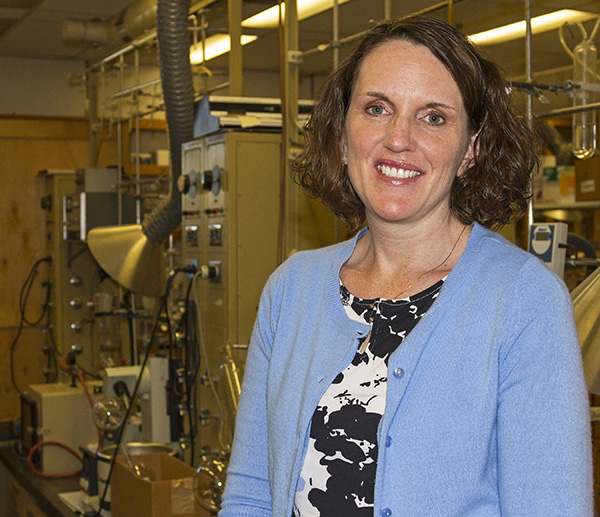 Chemistry Professor Katherine McReynolds will use the grant to expand her student research team. (Sacramento State/Craig Koscho)
Chemistry Professor Katherine McReynolds will use the grant to expand her student research team. (Sacramento State/Craig Koscho)A four-year, $425,000 grant from the National Institutes of Health (NIH) is helping Sacramento State students contribute to the fight against HIV.
The grant recently was awarded to Professor Katherine McReynolds in the Department of Chemistry, and it will allow her to expand the student research team (two graduate students and six undergraduates) that is working on a new approach to prevent HIV and AIDS. McReynolds will be able to add two more students with the new grant, “and the group will likely continue to grow,” she says.
“We really try to push the students to get that hands-on experience outside the classroom,” she says. “Having a strong research background can help them get that first job, or get into a competitive graduate program.”
The process she and her team are pursuing is one that would create a topical agent that creates a barrier between the cell and the virus.
“I think it’s a great strategy that could potentially have a huge impact in decreasing the number of new cases of HIV,” says McReynolds. “It’s meant to be a preventative agent, something that can be used in advance of an HIV exposure.”
More than 1.2 million people in the United states are living with HIV, according to the federal government’s AIDS website. Like other viruses, HIV invades the body’s cells and takes over to start producing new copies of the virus. “What we’re trying to do is prevent the cell from getting infected in the first place.”
The team also is using green methodologies to build their molecules. “We have minimized the number of steps in building these molecules, and we usually try to run our reactions in water, which is the greenest solvent you can use,” McReynolds says. And in “cooking” the reactions, the researchers use a special microwave to speed up the reactions and improve the yields.
Winning NIH grants is not easy. McReynolds has had NIH funding previously, but recently had run into a period of time when she had no outside funding to support her research program. Fortunately, the CSU Program for Education and Research in Biotechnology (CSUPERB) has bridging grants available for this exact purpose. “This provided a mechanism to keep the research going,” she says.
The campus recently became eligible for a different grants program at NIH, known as the SCORE (Support of Competitive Research), when it achieved Hispanic Serving Institution status. The funding comes from an umbrella program, the Minority Biomedical Research Support (MBRS) Program, that supports projects intended to increase the number of diverse students graduating with scientific research backgrounds, while also raising the level of biomedical research activity on campus. McReynolds’ successful grant application represents the first grant funded through this program for Sacramento State.
Even then, it was a lengthy and complicated application process, McReynolds credits Sacramento State’s Research Affairs office, led by Associate Vice President David Earwicker, with providing assistance in compiling the required institutional data for the funding request.
All of the work paid off, creating a winning situation for the students, Sacramento State, and everyone involved in the fight against HIV.
For more information about the project, contact McReynolds at (916) 278-6551 or kdmcr@csus.edu. – Craig Koscho
In the media:
"New grant helping Sacramento State fight HIV," CBS 13
"Sacramento State students pursue HIV research with federal grant," The Sacramento Bee
